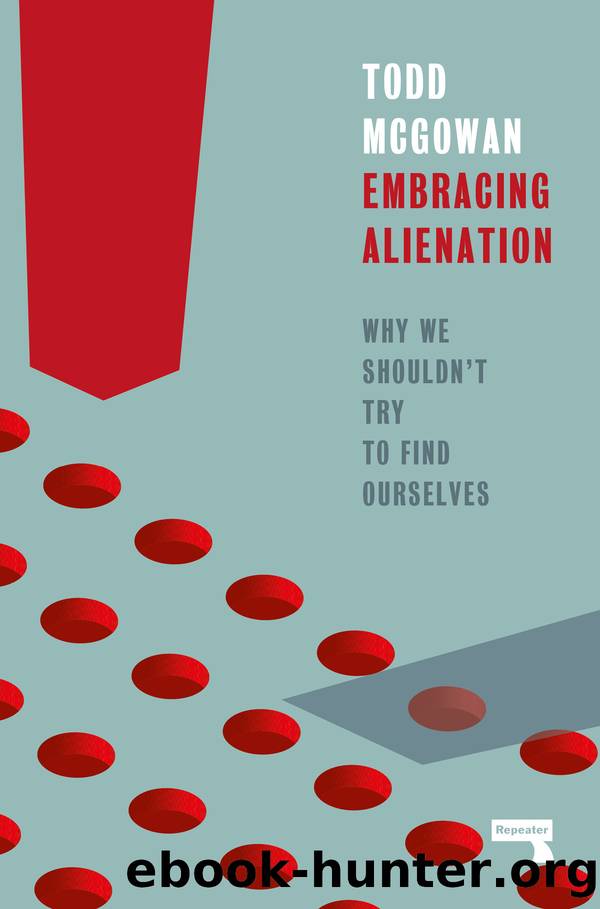Embracing Alienation: Why We Shouldnt Try to Find Ourselves by Todd Mcgowan

Author:Todd Mcgowan [Mcgowan, Todd]
Language: eng
Format: epub
Tags: Political Science, History & Theory, Political Ideologies, Communism; Post-Communism & Socialism, Philosophy, Political
ISBN: 9781915672230
Google: GoDKEAAAQBAJ
Publisher: Watkins Media Limited
Published: 2024-04-08T23:00:00+00:00
Chapter Five
From Community to the Public
Out in the World
The embrace of alienation leads us to an existence as public beings. The alienated subject is displaced and outside of itself. As a result, this subject, when we recognize it, becomes open to the encounter with other alienated subjects, an experience that constitutes the public. Every time that an alienated subject encounters another, a public world emerges. Even if the public quickly closes down as the parties retreat back into their symbolic identities, its momentary emergence exhibits what equality and solidarity look like. They involve being together in a shared alienation. To pay attention to oneâs alienation is to engage in the recognition of the public in an era that incessantly denigrates it.
Jürgen Habermas was the first to theorize the public sphere as a political site where an egalitarian logic rules. Even though it violates this pledge by keeping many people out and giving more weight to the views of certain privileged voices, the public sphere promises universal access and equal weight to every idea articulated there. For Habermas, the ideal of the public sphere has an egalitarian social effect in spite of its failure to live up to the standard that it sets for itself. But he sees the public sphere as an arena that has largely disappeared with the development of capitalist society. Even though capitalism helps to birth the public sphere, it also brings about its death.
In The Structural Transformation of the Public Sphere, Habermas details the assault on the public sphere by the forces of capital. This happens primarily through the domination of the commodity form and its imprint on everything. Once the members of the public become purely consumers thinking in terms of the commodity, the public sphere effectively disappears. Or as Habermas puts it, âWhen the laws of the market governing the sphere of commodity exchange and of social labor also pervaded the sphere reserved for private people as a public, rational-critical debate had a tendency to be replaced by consumption, and the web of public communication unraveled into acts of individuated reception, however uniform in mode.â1 The logic of the commodity disperses the public sphere into isolated individualized acts that cease to bring people together in a world underwritten with egalitarian ideals. For Habermas, bourgeois culture generates the public sphere as a site for contestation and debate, and then capitalist society destroys it as the reach of commodification extends everywhere.
In the history of the bourgeois public sphere that Habermas relates, it develops primarily in privileged spaces, such as coffee houses and salons. When one enters these spaces, according to Habermas, one retains oneâs private identity while at the same time turning that private identity toward the public. Private people form a public by advancing their own opinions in a place where every opinion ideally has an equal weight.
Habermasâs understanding of the public sphere, as important as it clearly is, undersells both the breadth of the public and the alienation required to produce it.2 The public
Download
This site does not store any files on its server. We only index and link to content provided by other sites. Please contact the content providers to delete copyright contents if any and email us, we'll remove relevant links or contents immediately.
| Anarchism | Communism & Socialism |
| Conservatism & Liberalism | Democracy |
| Fascism | Libertarianism |
| Nationalism | Radicalism |
| Utopian |
The Secret History by Donna Tartt(19092)
The Social Justice Warrior Handbook by Lisa De Pasquale(12191)
Thirteen Reasons Why by Jay Asher(8912)
This Is How You Lose Her by Junot Diaz(6889)
Weapons of Math Destruction by Cathy O'Neil(6281)
Zero to One by Peter Thiel(5802)
Beartown by Fredrik Backman(5756)
The Myth of the Strong Leader by Archie Brown(5509)
The Fire Next Time by James Baldwin(5447)
How Democracies Die by Steven Levitsky & Daniel Ziblatt(5219)
Promise Me, Dad by Joe Biden(5154)
Stone's Rules by Roger Stone(5088)
A Higher Loyalty: Truth, Lies, and Leadership by James Comey(4964)
100 Deadly Skills by Clint Emerson(4926)
Rise and Kill First by Ronen Bergman(4790)
Secrecy World by Jake Bernstein(4753)
The David Icke Guide to the Global Conspiracy (and how to end it) by David Icke(4720)
The Farm by Tom Rob Smith(4514)
The Doomsday Machine by Daniel Ellsberg(4490)
